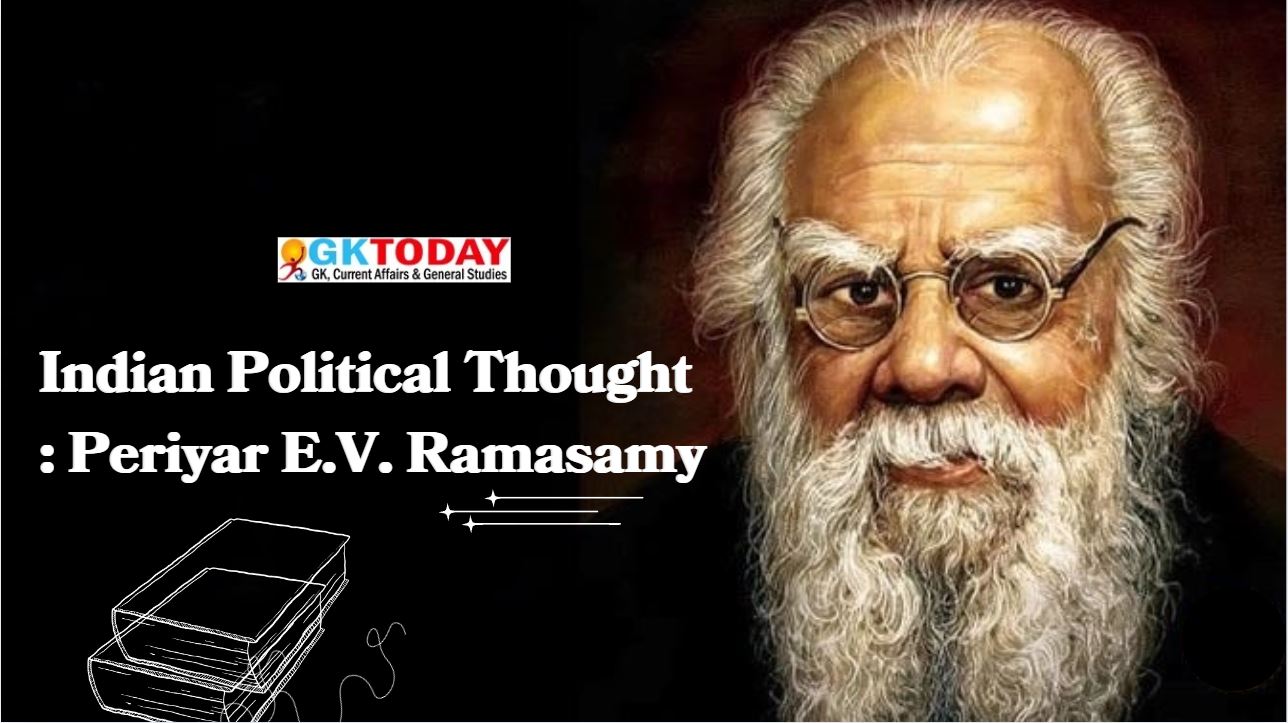Indian Political Thought: Periyar E.V. Ramasamy
Erode Venkatappa Ramasamy, commonly known as Periyar, was a prominent social reformer and political thinker in India. Born on September 17, 1879, in Erode, Tamil Nadu, he played important role in advocating for social justice and equality. His life’s work focused on dismantling the caste system, promoting rationalism, and championing the rights of marginalized communities.
Biographical Information
Periyar was born into a middle-class family. His formal education was limited, but he was deeply influenced by various social reform movements. He became a prominent figure in the early 20th century, using his voice to challenge societal norms.
Key Contributions
Periyar’s contributions include:
- Founder of the Self-Respect Movement (1925): This movement aimed to instil self-respect among the oppressed classes, encouraging them to reject caste-based discrimination.
- Established the Dravidar Kazhagam (1944): This political party advocated for the rights of non-Brahmins and sought to promote social justice.
- Advocated for social justice: Periyar fought for the rights of lower castes and women, promoting their empowerment.
- Rationalism and atheism: He promoted scientific temper and opposed religious dogma.
Philosophical Ideas
Periyar’s philosophies were revolutionary for his time:
- Anti-Casteism: He vehemently opposed the caste system and Brahminical dominance.
- Rationalism: Emphasised the importance of reason and scientific thinking over blind faith.
- Self-Respect: Encouraged the oppressed to embrace their dignity and reject societal labels.
- Atheism: Criticised religious orthodoxy, viewing it as a tool for oppression.
Political Engagement
Periyar was actively involved in political discourse:
- Critique of the Indian National Congress: He argued that the Congress was elitist and failed to address social inequalities.
- Justice Party: Joined this party to represent non-Brahmins’ interests.
- Language Advocacy: Opposed Hindi imposition, supporting Tamil and regional languages instead.
Social Reforms
Periyar’s social reform initiatives included:
- Women’s Rights: Advocated for women’s education and property rights.
- Anti-Superstition Campaigns: Fought against social evils such as child marriage and dowry.
- Abolition of Untouchability: Worked tirelessly to eradicate caste discrimination.
Legacy
Periyar’s influence is deep:
- Dravidian Movement: His ideas shaped the Dravidian movement in Tamil Nadu.
- Inspiration for Leaders: Influenced prominent leaders like C.N. Annadurai and M. Karunanidhi.
- Contemporary Relevance: His philosophies remain relevant in ongoing discussions about caste and social justice.
Literary Contributions
Periyar was also a prolific writer:
- Essays and Pamphlets: Authored numerous works advocating for social reform and rationalism.
- Notable Works: “The Ethical and Moral Values of the Dravidian People” and “The Self-Respect Movement” are among his publications.
Recognition and Honors
Periyar’s contributions have been recognised posthumously:
- Key Figure Recognition: Acknowledged as a very important figure in the fight against caste discrimination.
- Statues and Memorials: Numerous statues and memorials have been erected in his honour across Tamil Nadu.
Criticism
Despite his contributions, Periyar faced criticism:
- Harsh Rhetoric: His strong criticism of Hinduism and Brahmins was often viewed as divisive.
- Divisive Approach: Some critics argue that his methods did not encourage unity among communities.
Influence on Contemporary Politics
Periyar’s ideas continue to shape modern political discourse:
- Political Party Influence: His philosophies have influenced various political parties in Tamil Nadu advocating for social justice.
- Reference Point: Continues to be a reference point in discussions surrounding caste and social equity in Indian politics.
The legacy of Periyar E.V. Ramasamy continues to inspire new generations in the fight against caste discrimination and social oppression.


